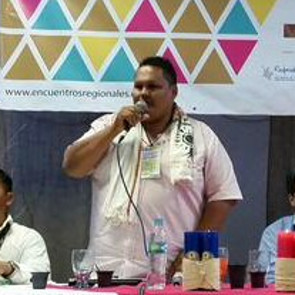Take Action for José Vicente Murillo Tobo
On 2 April 2017, human rights defender, José Vicente Murillo Tobo, received a text message and phone calls threatening him as a result of his human rights work in Colombia.
José Vicente Murillo Tobo is the leader of Movimiento Político de Masas Social y Popular del Centro Oriente de Colombia (Political Movement of Social and Popular Masses of the Centre East of Colombia), national spokesperson for the Cumbre Agraria, Campesina, Étnica y Popular (Agrarian, Peasant, Ethnic and Popular Summit), and member of the Congreso de los Pueblos (Congress of Peoples). Movimiento Político de Masas Social y Popular del Centro Oriente de Colombia is a campesino organisation which struggles for land rights and for the rights of marginalised persons, such as indigenous and afro-descendent people, in the central-eastern region of Colombia. Cumbre Agraria, Campesina, Étnica y Popular has its origins in the agricultural strikes which took place in Colombia in 2013, due to the low prices of agrarian commodities in the international market. The Summit gathers different indigenous, afro-descendent, campesino and popular movements in order to propose a new model to strengthen their rights and work. Congreso de los Pueblos is a social movement which brings together different sectors and social actors. Since its launch in 2010, it has had a prominent role in social mobilisations in Colombia, such as the agricultural strikes of 2013, 2014 and 2016.
On 2 April 2017, in the afternoon, José Vicente Murillo Tobo attended the cultural exchange round-table for dialogue and consultation between the organisation for indigenous people, Uwa Nation, and Movimiento Político de Masas Social y Popular del Centro Oriente de Colombia with the Colombian government. After the meeting, the human rights defender received a text message and a phone call containing threats against his work. The person identified himself as Camilo and said he was the leader of Águilas Negras (Black Eagles), a paramilitary organisation in Colombia. Camilo said that “we need to talk to you, we know of your movements, we know those you work for, we need you to cooperate with the instructions that we are going to give, otherwise it will be up to us what we do next”.
During a series of coordinated events between 21 and 22 March 2017, the Police and the National Army conducted raids on homes and arrested several social leaders and human rights defenders from the southern Bolívar region, including members of the Congreso de los Pueblos. The Colombian State has previously accused social leaders of being linked to guerrilla groups without concrete evidence.
I am concerned about the number of killings, aggressions, threats, intimidation and other violent acts against human rights defenders in Colombia. On 2 March 2017, the killing of Ruth Alicia Lopez Guisao brought the number of community leaders killed in the country to 25 since the start of this year. The human rights defender worked with indigenous people and was a member of Congreso de los Pueblos. In its 2017 Annual Report, which covers the period between January and December 2016, Front Line Defenders reported 281 killings of human rights defenders worldwide. 86 of those killings took place in Colombia, making it the country with the highest number of killings of human rights defenders in the world.
According to a report from the Colombian Ombudsman Office, 156 social leaders and human rights defenders have been killed in the last 14 months. In addition to that, there were reported 5 disappearances, 33 attacks and over 500 instances of threats. According to the Ombudsman Carlos Alfonso Negret Mosquera: “one of the main causes of this phenomenon is the attempt by illegal armed groups to occupy the territory from which the FARC have withdrawn”.
The Colombian government signed a peace deal with Fuerzas Armadas Revolucionarias de Colombia (Revolutionary Armed Forces of Colombia, FARC) rebels in November 2016, but this has not made the country safer for indigenous and human rights activists. Despite all evidence to the contrary, the government continues to maintain the position that these killings are neither systematic nor linked to paramilitary activity, and refuses to recognise the cause of the deaths instead of taking actions to prevent them from happening.
I express concern at the most recent threats against human rights defender José Vicente Murillo Tobo, which is in relation to his human rights work and leading roles in his community and organizations. I express further concern at the ongoing stigmatisation of social leaders in Colombia, particularly human rights defenders working on areas that have been historically affected by the presence of illegal armed groups.
I urge the authorities in Colombia to:
1. Carry out an immediate, thorough and impartial investigation into threats and intimidation against José Vicente Murillo Tobo, with a view to publishing the results and bringing those responsible to justice in accordance with international standards;
2. Take all the necessary measures to guarantee the physical and psychological integrity of José Vicente Murillo Tobo, as well as all the members of Congreso de los Pueblos and other grass-roots organizations in Colombia;
3. Cease targeting human rights defenders in Colombia and guarantee in all circumstances that they are able to carry out their legitimate human rights activities without fear of reprisals and free of all restrictions including judicial harassment.
Sincerely,

